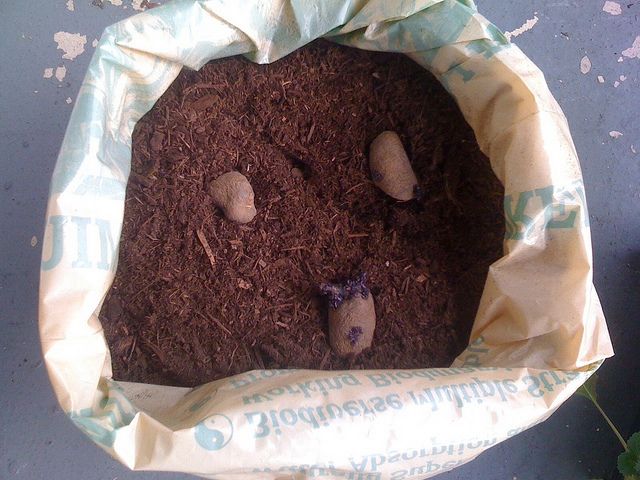
Are you growing potatoes in a bag this summer? Here's more on everyone's favorite starchy tuber from our garden specialist Amy Pennington:
Potatoes grow underground and are considered a "tuber" -- a plant that is enlarged to store nutrients and has the ability to make a new plant. Potatoes, yams and even dahlias are considered tubers. So why do you need to know what at tuber is?
Here is some great info for all your science nerds to help shed light on the growth pattern of potatoes. Ultimately, this information is meant to help you -- if you’re going to build a potato-loving system that is highly productive, you've got to think like the plant!
You care about what a tuber is because tubers produce plants from a stolon (a sub-soil, sprout-like, horizontal root). The stolon is formed from the axils of the plant -- the place where the stem and leaves connect. I bet you thought potatoes form and grow off of a piece of cut potato? Well instead, potatoes actually grow between the original seed piece you plant, and the above-ground leaves. They're the stem of the plant, not the root.
Potatoes are a member of the Nightshade family (alongside tomatoes, eggplant, and of course, the deadly nightshade), some of which are toxic plants. Nightshades are prone to soil disease and must be rotated around the garden year after year in order to minimize problems with the soil. For a home gardener working in beds, this means diligent planning or designating an area outside your beds for potatoes. (Good news! If you grow in bags on your patio, you don't have to worry about this!)
Lastly, here's an alternative to using soil to mound your potato plant: you can also layer the stem in straw. That's right — just straw. It acts as a growing medium for the potatoes — a clean, unmessy growing medium. No cleaning off soil when you harvest, as potatoes will grow directly into the straw. Even better, in warm climates (down south, for instance), the straw layers help moderate temperatures and insulate the bag, which is perfect for potatoes that don't do well in the heat.
What are your tips for growing potatoes?

See what other Food52 readers are saying.